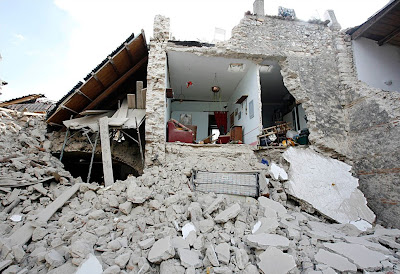 Monday's earthquake in central Italy brought disaster back to the forefront of international attention. Disasters take many forms, but are related in their unpredictable and severely disruptive effects. What does the threat of disaster mean for cities?
Monday's earthquake in central Italy brought disaster back to the forefront of international attention. Disasters take many forms, but are related in their unpredictable and severely disruptive effects. What does the threat of disaster mean for cities?In many ways, urbanization increases our vulnerability to large-scale disaster. It multiplies damages associated with contagious disease, violent conflict, extreme poverty, environmental harzard, and loss of cultural heritage. As settlements become more concentrated in fewer places, threats to these places pose greater risk to stability at national and international levels.
 At the same time, cities hold advantages for disaster prevention and recovery. In comparison with rural areas, they are more connected to global support and information networks. Public services, while not always dependable, offer some protection against the most devastating effects of disasters. Cities are also repositories of knowledge and resources that can be applied towards reducing vulnerabilities. Urban disasters don't always bring chaos, and can even inspire a sense of shared purpose, as evident in the resilience of Mumbai's population after the terrorist attacks last November.
At the same time, cities hold advantages for disaster prevention and recovery. In comparison with rural areas, they are more connected to global support and information networks. Public services, while not always dependable, offer some protection against the most devastating effects of disasters. Cities are also repositories of knowledge and resources that can be applied towards reducing vulnerabilities. Urban disasters don't always bring chaos, and can even inspire a sense of shared purpose, as evident in the resilience of Mumbai's population after the terrorist attacks last November.Cities can prepare to mitigate disaster through coordinated governance and policy. Less concentrated settlements are worth considering, though population distribution isn't something to be forced. In most cases, I think we're better off strengthening the places where people choose to live. As the world's urban population grows rapidly, managing the threat of disaster to cities will be increasingly important for development and stability.
(Photo of a damaged house in Castelnuovo, Italy from Komonews.com; Photo of people in front of the Taj Mahal Hotel in Mumbai from Chinaview.cn)

1 comment:
The problem with cities and disasters is simply the flip side of density. Scale and density provide the greater capability to specialize, which means there is lesser self-sufficiency. When the system is working, it's great. But when it fails...
Post a Comment